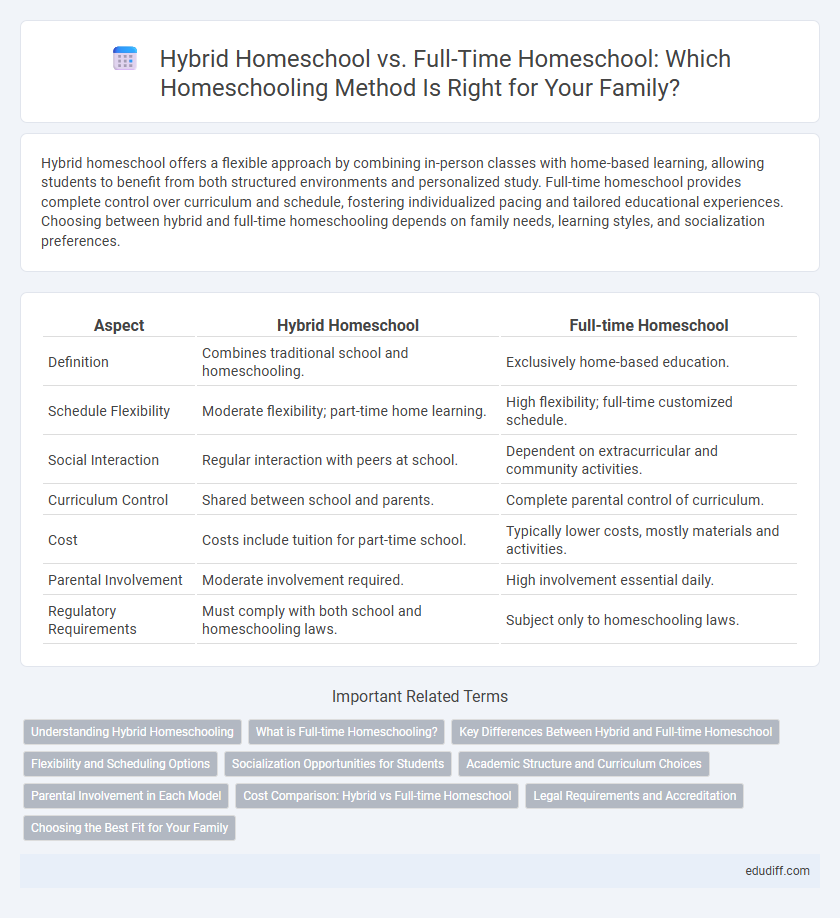Hybrid homeschool offers a flexible approach by combining in-person classes with home-based learning, allowing students to benefit from both structured environments and personalized study. Full-time homeschool provides complete control over curriculum and schedule, fostering individualized pacing and tailored educational experiences. Choosing between hybrid and full-time homeschooling depends on family needs, learning styles, and socialization preferences.
Table of Comparison
| Aspect | Hybrid Homeschool | Full-time Homeschool |
|---|---|---|
| Definition | Combines traditional school and homeschooling. | Exclusively home-based education. |
| Schedule Flexibility | Moderate flexibility; part-time home learning. | High flexibility; full-time customized schedule. |
| Social Interaction | Regular interaction with peers at school. | Dependent on extracurricular and community activities. |
| Curriculum Control | Shared between school and parents. | Complete parental control of curriculum. |
| Cost | Costs include tuition for part-time school. | Typically lower costs, mostly materials and activities. |
| Parental Involvement | Moderate involvement required. | High involvement essential daily. |
| Regulatory Requirements | Must comply with both school and homeschooling laws. | Subject only to homeschooling laws. |
Understanding Hybrid Homeschooling
Hybrid homeschooling combines traditional classroom instruction with home-based learning, allowing students to benefit from both structured environments and personalized education. This model offers flexibility in curriculum design, promoting a balance between social interaction and individualized pace, which can enhance academic performance and motivation. Understanding hybrid homeschooling requires recognizing its potential to cater to diverse learning styles and family needs while maintaining consistent educational standards.
What is Full-time Homeschooling?
Full-time homeschooling involves parents or guardians taking complete responsibility for their child's education, delivering all academic instruction at home rather than relying on traditional schools. This method allows customization of curriculum, pacing, and learning style to fit the student's unique needs, often incorporating a wide range of subjects from math and science to arts and social studies. Families who choose full-time homeschooling often benefit from greater flexibility, personalized attention, and the ability to integrate life skills and experiential learning into the daily routine.
Key Differences Between Hybrid and Full-time Homeschool
Hybrid homeschool combines online or classroom-based instruction with traditional homeschooling, offering flexibility and access to diverse resources. Full-time homeschool relies exclusively on parent-led instruction at home, providing personalized pacing and curriculum choices tailored to the child's needs. Key differences include scheduling flexibility, socialization opportunities, and the balance between independent and guided learning environments.
Flexibility and Scheduling Options
Hybrid homeschool offers greater flexibility by combining traditional classroom learning with at-home instruction, allowing parents to tailor schedules to fit family needs and extracurricular activities. Full-time homeschool requires a more consistent daily commitment but enables complete control over curriculum pacing and timing, ideal for families seeking a fully customized education. Both methods provide adaptable scheduling options, but hybrid programs often accommodate socialization opportunities alongside academic work.
Socialization Opportunities for Students
Hybrid homeschool offers structured socialization opportunities through group classes, extracurricular activities, and community events, enabling students to interact regularly with peers. Full-time homeschool allows more flexible socialization, often relying on family-organized gatherings, co-ops, and local clubs to foster peer relationships. Both models prioritize social development differently, with hybrid homeschool providing more consistent social exposure and full-time homeschool emphasizing personalized, interest-based social interactions.
Academic Structure and Curriculum Choices
Hybrid homeschool combines traditional classroom instruction with at-home learning, offering a flexible academic structure that allows parents to select specific subjects for homeschooling while relying on external schools for others. Full-time homeschool provides complete control over the curriculum, enabling parents to tailor lessons to the child's learning style, pace, and interests without the constraints of public school schedules. Curriculum choices in hybrid models often include state-approved courses or public school materials, whereas full-time homeschoolers frequently utilize customized or specialized programs such as classical, Montessori, or online academies.
Parental Involvement in Each Model
Hybrid homeschool models require moderate parental involvement, balancing responsibilities with external educational resources and part-time classroom settings. Full-time homeschool demands intense parental engagement, as parents act as primary educators, designing curriculum, managing daily lessons, and assessing progress. Parental commitment levels directly impact student outcomes, shaping academic achievement and social development in both hybrid and full-time homeschooling approaches.
Cost Comparison: Hybrid vs Full-time Homeschool
Hybrid homeschooling typically incurs lower costs than full-time homeschooling due to reduced expenses for curricula and extracurricular activities, as families often share resources with traditional schools. Full-time homeschooling requires a larger investment in comprehensive teaching materials, specialized tutors, and educational technology to cover all subjects independently. Budgeting for hybrid homeschooling allows families to benefit from public school resources, resulting in a more cost-effective educational approach compared to the more resource-intensive full-time homeschool model.
Legal Requirements and Accreditation
Hybrid homeschool combines in-person classes with home-based education, often adhering to stricter state regulations and requiring enrollment in accredited programs or partnerships with public schools. Full-time homeschool offers complete control over curriculum and schedule but requires compliance with legal requirements such as registration, standardized testing, and record-keeping, which vary by state. Accreditation is typically necessary for hybrid programs to maintain legitimacy, while full-time homeschool families may seek independent accreditation or participate in umbrella schools to validate their educational standards.
Choosing the Best Fit for Your Family
Hybrid homeschool combines traditional classroom instruction with at-home learning, offering flexibility for families seeking a balance between social interaction and personalized education. Full-time homeschool provides comprehensive control over curriculum and pace, ideal for families prioritizing tailored instruction and a customized learning environment. Evaluating your child's learning style, family schedule, and educational goals is essential to determine whether hybrid or full-time homeschool best fits your family's needs.
Hybrid Homeschool vs Full-time Homeschool Infographic

 edudiff.com
edudiff.com